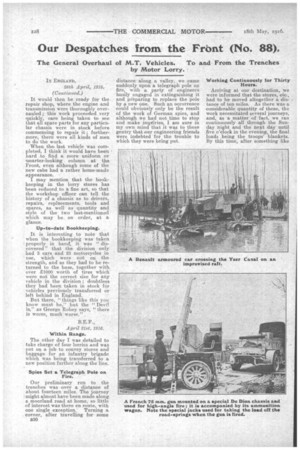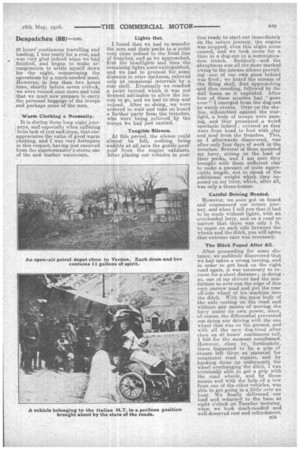Our Despatches from the Friant (No. 88).
Page 6

Page 7

If you've noticed an error in this article please click here to report it so we can fix it.
The General Overhaul of M.T. Vehicles. To and From the Trenches by Motor Lorry.
IN ENGLAND,
28th April, 1916. (Continued.)
It would then be ready for the repair shop, where the engine and transmission were thoroughly overhauled ; this work proceeded very quickly, care being taken to see that all spare parts for any particular chassis were in stock before commencing to repair it ; furthermore, there were all kinds of men to do the work.
When thelast vehicle was completed, I think it would have been hard to find a more uniform or smarter-looking column at the Front, even although some of the new cabs had a rather home-made appearance. • I may mention that the bookkeeping in the lorry stores has been reduced to a fine art, so that the workshop officer can tell the history of a chassis as to drivers, repairs, replacements, tools and spares, as well as quantity and style of the two last-mentioned which may be on order, at a glance.
Up-to-date Bookkeeping.
It is interesting to note that when the bookkeeping was taken properly in hand, it ° was " discovered" that the division only had 3 cars and 23 motorcycles in use, which were not on the strength, and so they had to be returned to the base, together with over £1000 worth of tires which were not the correct size for any vehicle in the division ; doubtless they had been taken in stock for vehicles previously transferred or left behind in England. •
But there, "things like this you know must be," but the "Devil is," as George Robey says, "there is worse, much worse."
REF.,
April 21st, 1916.
Within Range.
The other day I was detailed to fake charge of four lorries and was out on a job to convey stores and baggage for an infantry brigade which was being transferred to a new position further along the line.
Spies Set a Telegraph Pole on
Fire.
Our preliminary run to the trenches was over a distance of about fourteen miles. The journey might almost have been made along a moorland road at home, so little of interest was there en route, with one single exception: Turning a corner, after travelling for some B30 distance along a valley, we came suddenly upon a telegraph pole on fire, with a party of engineers busily engaged in extinguishing it .
and preparing to replace the pole by a new one. Such an occurrence could obviously only be the result Of the work of German spies, and although we had not time to stop and make inquiries, I am sure in my own mind that it was to these gentry that our engineering friends were indebted for the trouble to which they were being put.
Working Continuously for Thirty Hours.
Arriving at our destination, we were informed that the stores, etc., had to be moved altogether a distance of ten miles. As there was a considerable quantity of these, the work necessitated several journeys, and, as a matter of fact, we ran continuously all through the Sunday night and the next day until five o'clock in the evening, the final loads being the troops' blankets. By this time, after something like 30 hours' continuous travelling and loading, I was ready for a rest, and was very glad indeed when we had finished, and began to make arrangements to settle myself down for the night, commencing the operations by a much-needed meal. however, in less than two hours itime, shortly before seven, o'clock, lwe were roused ,once more and told , that we must now prepare to carry the personal baggage of the troops and perhaps some of the men.
. Warm Clothing a Necessity.
. It is during these long night journeys, and' especially when suffering from lack of rest and sleep, that one • appreciates the value of good warm clothing, and I was veryfortunate in this respect, having just received from the quartermaster's stores one of the new leather waistcoats. Lights Out.
I found that we had to tgansfer the men, and their packs to a point very close indeed to the front line of trenches, and as we approached, first the headlights and then. the remaining lights were extinguished, and we had to proceed for some distance in utter darkness, relieved only -at occasional intervals by a star shell. Eventually we reached a point beyond which it was not deemed_ advisable to allow the lorries to go, and we had to stop and unload. After so doing, wp were ordered to wait and take on board a further party from the trenches, who were being relieved by the troops we had just carried.
Tangible Silence.
At this period, the silence could almost be felt, nothing being -audible at all save the gentle poufpouf from the engine exhausts. After placing our vehicles in posi
tion ready to start out immediately on the return. journey, the engine was stopped, even this slight noise ceased, and we took cover for a time in a dug-out in a communication trench. • Suddenly—and the abruptness was all the more marked owing to the intense silence prevailing—one of our own guns behind was fixed; we heard the scream of the flying shell, first approaching -arid then receding, followed by the dull boom as it exploded. After four of these missiles had "gone over" I emerged from the dug-out to watch events. Over on the skyline, silhouetted against the starlight, a body of troops were passing, and they presented a weird spectacle indeed ; covered as they were from head to Mot with clay and mud from the trenches. This, as I afterwards discovered, was after only four days of work in the trenches. Several of them mounted my lorry, sitting on the load of their packs, and I am sure they brought with them sufficient clay to make a parapet of quite appreciable length, not to speak of the additional weight which they imposed on my lorry, which, after all, was only a three-tonner.
Careful Driving Needed.
However, we soon got on board and commenced our return journey, and when I tell you that it had to be made without lights, with an overloaded lorry, and on a road so narrow that there was only 1 ft. to spare on each side between the wheels and the ditch, you will agree that extreme care was necessary.
The Ditch Found After All.
After proceeding for some distance, we suddenly discovered that we had taken a wrong turning, and in order to get back on the right road again, it was necessary to reverse for a short distance; in doing so, one of my drivers had the misfortune to ov.er-run the edge of this very narrow road and put the rear off-side wheel of his machine into the ditch. With the main body of the axle resting on the road and 'without any means of moving the lorry under its own power, since, of course, the differential prevented our doing any driving with the one wheel that was on the ground, and with all the men dog-tired after close on 40 hours' continuous toil, I felt for the moment nonplussed. However, close by, fortunately, there happened to be a pilei of stones left there as material for occasional road repairs, and by banking these up underneath the wheel overhanging the ditch, I was eventually able to get a grip with the road wheels, and by -these means and with the help of a tow from one of the other vehicles, waS able to get going in a little over an hour. We finally delivered our load and returned to the base at eight o'clock on Tuesday morning, when we took much-needed and well-deserved rest and refreshment.




















